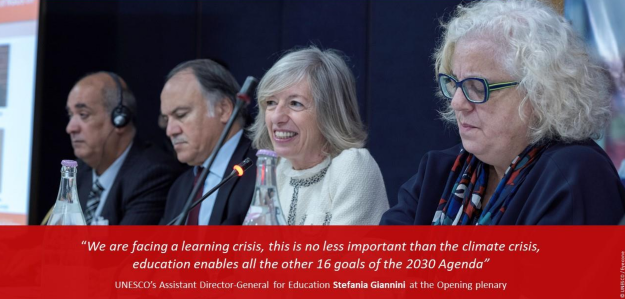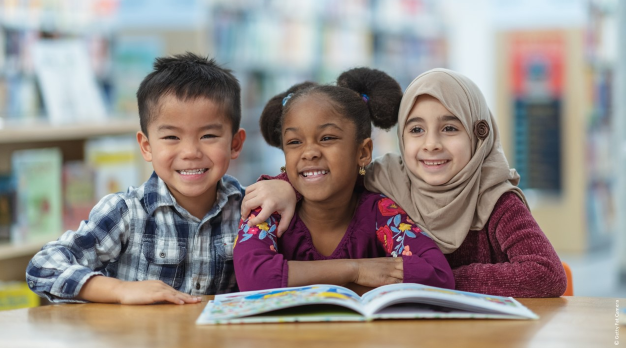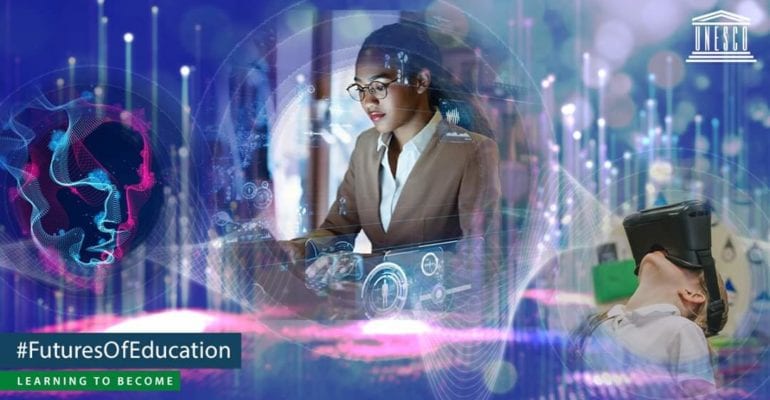Blog by Evelyne Para, SI UN Representative to the United Nations Educational, Scientific, and Cultural Organisation (UNESCO).
“During the working meeting organised on 10 March 2020 at UNESCO, by Marie-Claude Machon-Honore (Chairperson of the Liaison Committee of NGOs in partnership with UNESCO), interesting exchanges allowed several members of Civil Society Organisations (CSO) to start building the advocacy work of NGOs towards ‘The Futures of Education – Learning to Become’. A summary of our work will be reported to the next Collective Consultation of NGOs on Education 2030 (CCONG-Education 2030), as well as to the UNESCO SDG4 Steering Committee.

Image courtesy of the 9th Collective Consultation of NGOs on Education 2030 report.
CCONG-Education 2030 World Meeting.
First, we looked at the report of the 9th CCNGO World Meeting held in December 2019 in Hammamet, Tunisia, on the theme ‘Educating for an Inclusive and Sustainable Future’. The objective of this meeting was to strengthen collective initiatives aimed at implementing the Sustainable Development Goals (SDGs) and education targets, based on the activities undertaken, the main difficulties encountered, the progress made and future prospects.
During the opening plenary of this World Meeting, the main speakers recalled that without more inclusive and transformative policies that tackle the multiple causes of school exclusion, but also the methods and places of learning to equip learners with the skills and abilities of the 21st century, the vision of the 2030 Agenda will not be realised.
Prioritise Education to Achieve Sustainable Development.
The working meeting of 10 March 2020 at UNESCO allowed us to share our vision on the UNESCO’s Futures of Education program, and how knowledge and learning can shape the future of humanity and the planet, how education needs to be reimagined in a world of increasing complexity, of uncertainty and precarity. Soroptimist International and the other participating NGOs confirmed their common desire to encourage acceleration strategies through targeted actions on several fronts.
Acceleration Strategy 1. Prioritise Inclusion and Equity in Education:
- Leave no one behind, fight illiteracy, promote a culture of inclusion in and throughout education systems, to reach all learners prioritising the most disadvantaged and vulnerable.
- Design and implement affirmative policy actions and innovative learning programmes that act on the multiple factors preventing children and youth from pursuing a full education cycle.
- Ensure that education policies prioritise gender equality, eliminate all barriers to girls’ completion of 12 years of compulsory education, and encourage their participation in STEM.
- Increase investment in early childhood care and education to counter disadvantages and set the foundations for successful learning in school.
- Strengthen policies to include refugees, migrants, and the forcibly displaced, in national education systems, and ensure continuity of education in conflict and crisis-affected situations.
- Work beyond policy silos to connect education, health, nutrition, gender, technology and labour, bringing on board the expertise from governments, non-governmental organisations, civil society, teachers, youth and the private sector.

Image courtesy of the 9th Collective Consultation of NGOs on Education 2030 report.
Acceleration Strategy 2. Transform Education for Quality, Relevance, and Impact, Across the SDGs:
- Scale up investment in teachers through better training, professional development and decent working conditions, taking into account the 69 million teacher gap and teachers’ powerful influence on learning achievement.
- Transform teaching and learning to make education relevant in an evolving digital world and geared to building more sustainable and just societies. Progress towards all the SDGs can be accelerated if students are empowered with the knowledge, skills and values to address the social, cultural, environmental, and economic challenges of our times, to take informed decisions and become responsible global citizens. To this end, Education for Sustainable Development and Global Citizenship should be mainstreamed in learning programmes to concretely prepare all students to be responsible citizens, capable of contributing to the development of a democratic, united, pluralist society open to other cultures.
- Build projects within the school (cultural or environmental project, for example), with the participation of students, and systematise life experiences outside the school walls with people different by age, social background, disability, cultural origin…, so that young people realise that they now have a positive role to play in society, that they can be useful there, that all skills are necessary to live together, not only logical-mathematical and linguistic intelligence, but also all the others, and notably relational intelligence, which may not be stimulated or worked enough in school.
- Increase youth employability through more flexible education and training systems; skills anticipation, policies to facilitate school-to-work transition and lifelong learning opportunities spanning formal, informal, and non-formal pathways.
Acceleration Strategy 3. Better Data and Intermediate Benchmarks to Inform Action:
- Invest in better and more disaggregated data to shape targeted policy interventions, monitoring and accountability, including through building the capacities of national statistical systems.
- Set regional benchmarks to drive action around identified policy gaps.
Acceleration Strategy 4. Increased Funding for Equitable and Resilient Public Education Systems:
- Increase domestic financing to ensure governments commit at least 15% to 20% of public expenditure to education, notably through the broadening of the tax base, tax reform, anti-corruption measures, as well as by tackling illicit financial flows.
- Increase international financing to meet the benchmark of 0.7 % of Gross National Product and allocate at least 10% of that to education, matching development assistance with countries farthest behind, and strengthening coordination among actors. Education’s share in humanitarian aid must be increased.
Acceleration Strategy 5. Strengthened Partnerships
- Support partnerships and networks to collaborate across sectors and exchange good practices and innovations between actors at local, regional and global level, closely involving youth and civil society organisations in policy planning and implementation through a regular and structured dialogue”.
Helpful Resources:
Read more about the CCNGO 9th Global Meeting HERE.
Report CCNGO 9th Global Meeting
UNESCO Program on Futures of Education
Feature image courtesy of UNESCO.

